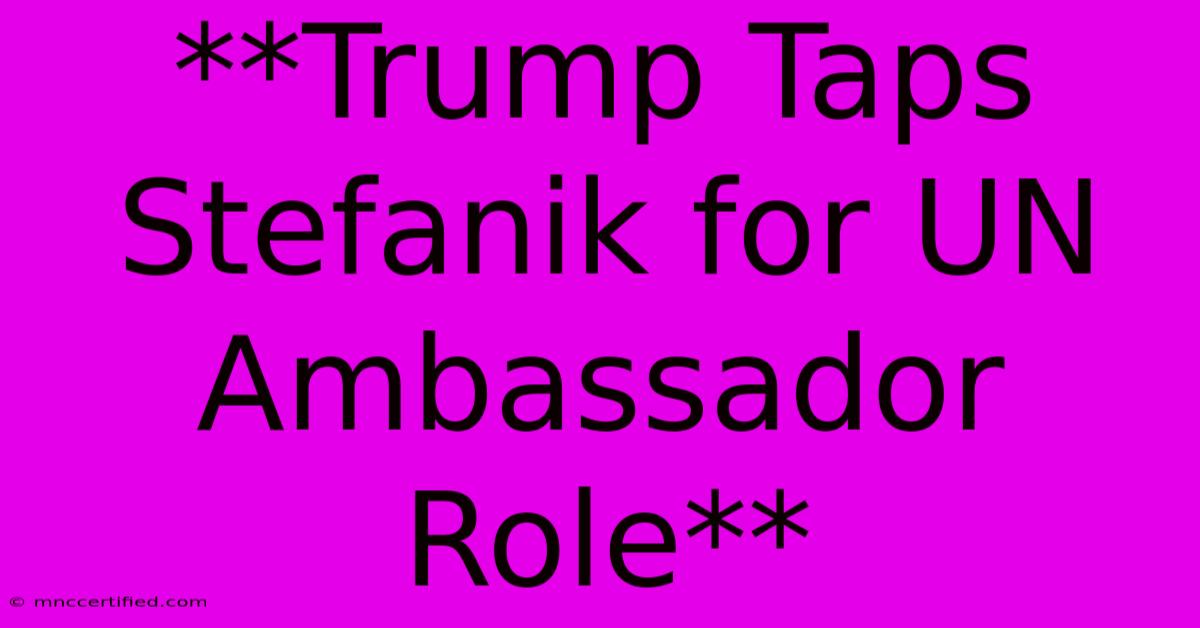**Trump Taps Stefanik For UN Ambassador Role**

Table of Contents
Trump Taps Elise Stefanik for UN Ambassador Role: A Controversial Choice
Former President Donald Trump has nominated Elise Stefanik, a Republican congresswoman from New York, to serve as the United States Ambassador to the United Nations. This appointment, announced on [Date], has sparked significant controversy due to Stefanik's political history and the potential implications for US foreign policy.
A Rising Star in the Republican Party
Elise Stefanik, at the age of 38, is considered a rising star in the Republican Party. Elected to the House of Representatives in 2014, she quickly ascended the ranks, becoming the youngest woman to serve as a member of the House Republican leadership. Stefanik is known for her staunch support of former President Trump, particularly during the January 6th Capitol riot, where she was one of the few Republicans to object to the certification of Joe Biden's electoral victory.
A Controversial Figure
Stefanik's political career has been marked by controversy. Her close ties to Trump, her voting record on issues like climate change and healthcare, and her frequent appearances on conservative media outlets have attracted criticism from both Democrats and some moderate Republicans. Her vocal support for Trump's policies and rhetoric has been viewed by some as a sign of her willingness to prioritize partisan politics over diplomacy and international cooperation.
Implications for US Foreign Policy
Stefanik's appointment as UN Ambassador raises questions about the future direction of US foreign policy. Critics argue that her lack of diplomatic experience and her history of partisan rhetoric could damage America's standing on the world stage and hinder efforts to address global challenges like climate change, human rights abuses, and international security threats.
Reactions to the Appointment
The news of Stefanik's nomination has been met with mixed reactions. Some Republicans have praised her as a capable and experienced leader, while Democrats have expressed concern about her qualifications and her potential to undermine US foreign policy. International observers have also voiced their concerns, citing her lack of diplomatic experience and her past statements on international issues.
What's Next?
Stefanik's nomination now faces the Senate confirmation process. It remains to be seen whether she will garner enough support to secure the position. The Senate vote will likely be a contentious one, with Democrats likely to oppose her confirmation.
Keywords: Elise Stefanik, UN Ambassador, Donald Trump, Republican Party, US Foreign Policy, Controversy, Nomination, Confirmation, Politics, Diplomacy, International Relations.

Thank you for visiting our website wich cover about **Trump Taps Stefanik For UN Ambassador Role**. We hope the information provided has been useful to you. Feel free to contact us if you have any questions or need further assistance. See you next time and dont miss to bookmark.
Featured Posts
-
Airlines Halt Haiti Flights Following Plane Shooting
Nov 12, 2024
-
Mtv Emas 30 Years Of Music History
Nov 12, 2024
-
Trump Appoints Stefanik To Un Ambassador
Nov 12, 2024
-
Bonding Worksheet Chemistry Answers
Nov 12, 2024
-
Spirit Airlines Flight To Haiti Hit By Gunfire
Nov 12, 2024